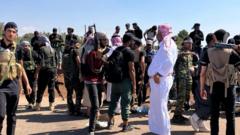Amid a fragile ceasefire in Suweida, southern Syria, Bedouin fighters have signaled their willingness to go back to hostilities with the Druze community should their demands not be met. After a week marked by intense sectarian violence involving Druze, Bedouins, and government forces – supported by Israeli airstrikes – Bedouin fighters have retreated to nearby villages but remain in a state of readiness.
A monitoring group reported a "cautious calm" in the region after a significant escalation of violence, but incidents of tribal fighters attacking villages persist. Observers noted smoke rising from Suweida city, once a Druze stronghold, now under tight government control. Armed Bedouin fighters, demanding the release of injured individuals they consider hostages, have crowded key roadways leading back into the city. They express frustration over the lack of compliance regarding their demands, asserting they are prepared to breach checkpoints to regain access.
One tribal elder relayed their stance to the BBC, emphasizing their adherence to government orders while stating that if hostages remain in the city, the conflict may reignite despite the ceasefire agreement. Last week’s violent clashes were ignited by the kidnapping of a Druze merchant, marking a resurgence of long-standing tensions between Bedouins and Druze factions.
Despite the ceasefire announced by interim government President Ahmed al-Sharaa and the deployment of government forces to restore order, the aftermath has been devastating. More than 1,120 people have reportedly died in the violence, including many civilians, with claims of atrocities surfacing against various factions involved.
In a humanitarian context, over 128,000 individuals have been displaced due to ongoing conflicts, with many relying on international aid for survival. Amidst the ruins of their communities, displaced Bedouin families now face grim conditions, wrestling with deep-seated mistrust towards the Druze community, fused with calls for effective governance to restore peace.
Elderly residents reflected on the dynamics between Druze and Bedouins, suggesting coexistence hinges on the commitment of the Syrian government to provide law and order. Without stabilizing authority, a sense of betrayal looms in the air, indicating the challenges ahead for any potential reconciliation efforts.
A monitoring group reported a "cautious calm" in the region after a significant escalation of violence, but incidents of tribal fighters attacking villages persist. Observers noted smoke rising from Suweida city, once a Druze stronghold, now under tight government control. Armed Bedouin fighters, demanding the release of injured individuals they consider hostages, have crowded key roadways leading back into the city. They express frustration over the lack of compliance regarding their demands, asserting they are prepared to breach checkpoints to regain access.
One tribal elder relayed their stance to the BBC, emphasizing their adherence to government orders while stating that if hostages remain in the city, the conflict may reignite despite the ceasefire agreement. Last week’s violent clashes were ignited by the kidnapping of a Druze merchant, marking a resurgence of long-standing tensions between Bedouins and Druze factions.
Despite the ceasefire announced by interim government President Ahmed al-Sharaa and the deployment of government forces to restore order, the aftermath has been devastating. More than 1,120 people have reportedly died in the violence, including many civilians, with claims of atrocities surfacing against various factions involved.
In a humanitarian context, over 128,000 individuals have been displaced due to ongoing conflicts, with many relying on international aid for survival. Amidst the ruins of their communities, displaced Bedouin families now face grim conditions, wrestling with deep-seated mistrust towards the Druze community, fused with calls for effective governance to restore peace.
Elderly residents reflected on the dynamics between Druze and Bedouins, suggesting coexistence hinges on the commitment of the Syrian government to provide law and order. Without stabilizing authority, a sense of betrayal looms in the air, indicating the challenges ahead for any potential reconciliation efforts.
















